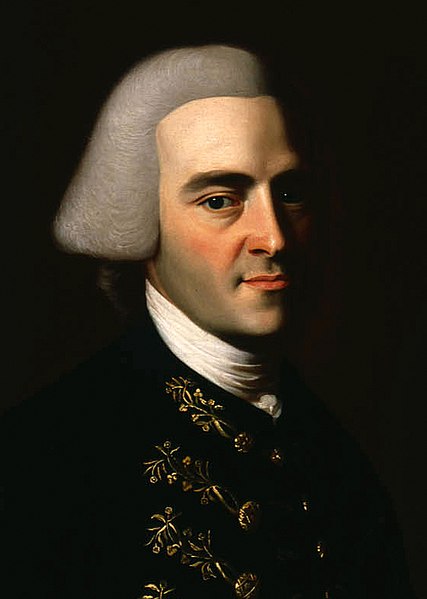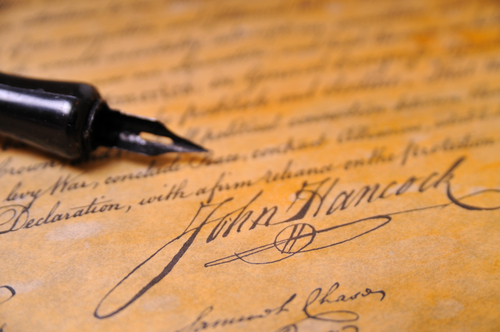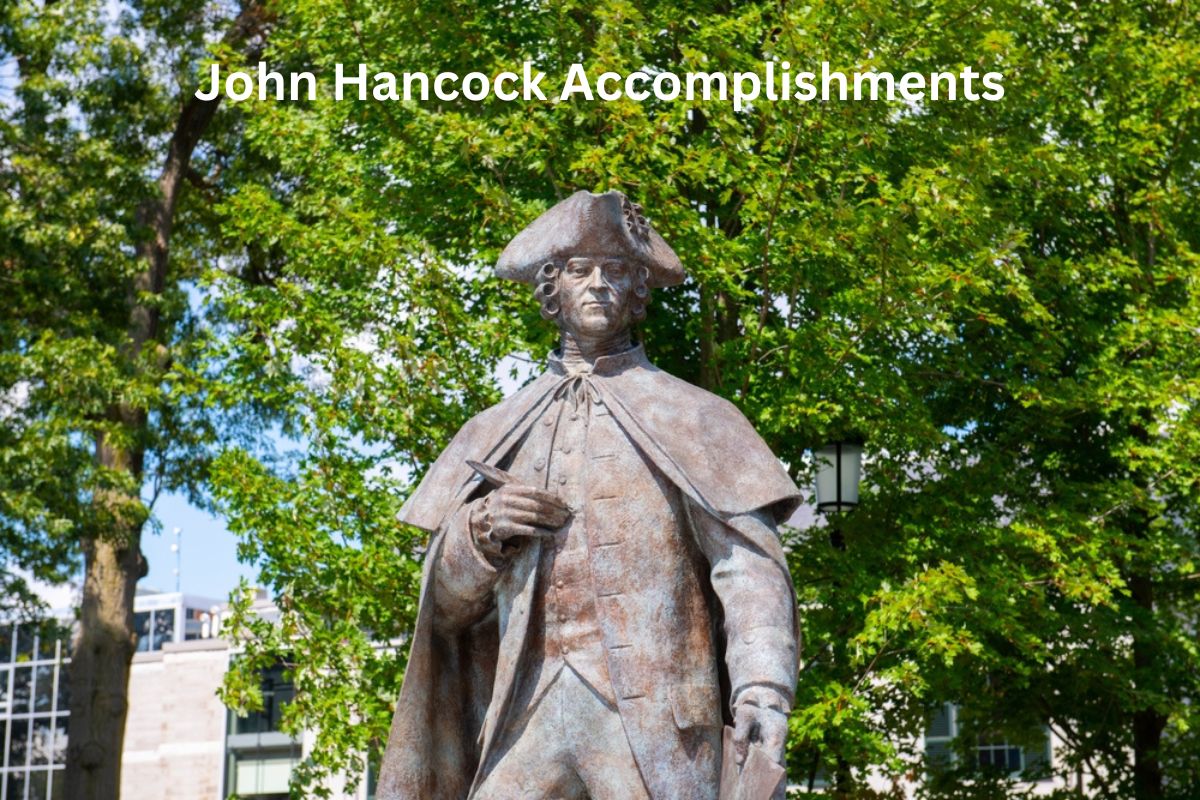John Hancock was a prominent figure in American history, known for his significant contributions to the American Revolution and the early formation of the United States.
As the President of the Second Continental Congress, he played a vital role in the adoption of the Declaration of Independence and became famous for his bold signature on the document.
Hancock also served as the Governor of Massachusetts, where he made significant contributions to the state’s politics and policies.
His accomplishments include building alliances, engaging in smuggling and boycotts, contributing to the drafting of the Massachusetts Constitution, philanthropy and public service, success as a merchant, leadership in the militia, and his ability to build political networks.
Through his actions, Hancock left a lasting impact on the fight for independence and the establishment of a new nation.
Accomplishments of John Hancock
1. President of the Second Continental Congress
In 1775, John Hancock was elected as the President of the Second Continental Congress, which was the governing body that represented the American colonies during the early stages of the American Revolution.
Also Read: Facts About John Hancock
As the President, Hancock presided over the meetings and discussions, ensuring that the sessions were conducted smoothly and efficiently. He played a pivotal role in maintaining order and fostering unity among the delegates, who were tasked with making critical decisions that would shape the future of the American colonies.

2. Signing the Declaration of Independence
John Hancock’s most notable achievement is his signature on the Declaration of Independence. As the President of the Continental Congress, Hancock was the first to sign the document on July 4, 1776.
His signature, bold and prominent, has become synonymous with the spirit of American independence and defiance against British rule. By signing the Declaration, Hancock boldly affirmed his commitment to the cause of freedom and inspired others to follow suit.
3. Governor of Massachusetts
After the American Revolution, John Hancock entered the realm of local politics in Massachusetts. He was elected as the Governor of Massachusetts in 1780 and assumed office in 1781.
Hancock served as the state’s governor for multiple terms, including from 1787 until his death in 1793. As Governor, Hancock played a vital role in shaping the politics and policies of Massachusetts during its transition from a colony to a state.
Also Read: Timeline of John Hancock
He championed the ideals of liberty, actively promoted the rights of individuals, and worked to establish a government that would uphold the principles enshrined in the newly formed United States.
4. Building alliances during the American Revolution
John Hancock possessed exceptional skills in building alliances and garnering support for the revolutionary cause. As a wealthy merchant and influential figure, he utilized his resources and connections to rally support for the Continental Army.
Hancock’s financial contributions were instrumental in financing the war effort, including the procurement of supplies, weapons, and provisions for the troops.
He also established important relationships with key figures such as George Washington and Benjamin Franklin, fostering unity and cooperation among the leaders of the American Revolution.

5. Engaging in smuggling and organizing boycotts
Prior to the outbreak of the American Revolution, John Hancock was actively involved in smuggling goods to evade British taxes and regulations.
As a successful merchant, he used his knowledge and networks to engage in illicit trade, helping to circumvent British control over colonial commerce. Hancock’s involvement in smuggling was not only a means of personal gain but also a form of resistance against British economic oppression.
Additionally, he played a crucial role in organizing and leading the boycotts against British goods, urging colonists to abstain from purchasing or consuming British products as a way to protest against unjust taxation and assert their economic independence.
6. Contributing to the drafting of the Massachusetts Constitution
As the Governor of Massachusetts, John Hancock made significant contributions to the drafting and promotion of the state’s first constitution, known as the Massachusetts Constitution of 1780.
Hancock supported the creation of a written constitution that would protect individual rights and establish a framework for democratic governance.
The Massachusetts Constitution, with its emphasis on popular sovereignty and the separation of powers, served as a model for the United States Constitution that would be drafted several years later.
Hancock’s involvement in shaping this foundational document reflects his commitment to the principles of liberty and democratic governance.
7. Philanthropy and public service
John Hancock was known for his philanthropic endeavors and dedication to public service. He generously donated significant sums of money to various causes, including the construction of schools and churches.
His financial contributions helped support educational initiatives, promote religious freedom, and improve the overall welfare of the community. Additionally, Hancock served as a benefactor for Harvard College, contributing to the establishment of the Hancock Professorship of Hebrew and other educational programs.
Through his philanthropy and public service, Hancock sought to foster social progress and create opportunities for the betterment of society.
8. Successful merchant
John Hancock’s success as a merchant played a crucial role in his ability to support the revolutionary cause and contribute to the formation of the United States. As a wealthy and influential businessman, he built a lucrative trading empire that spanned across the Atlantic.
Hancock’s financial success allowed him to finance the colonial resistance against British rule, providing funds and resources to support the Continental Army and other revolutionary efforts.
His entrepreneurial skills and economic prowess made him a key figure in the colonial economy and enabled him to make substantial contributions to the cause of American independence.
9. Militia leader during the American Revolution
John Hancock actively participated in the military efforts during the American Revolution and played a significant role in organizing and leading the Massachusetts militia.
He utilized his financial resources and influence to provide crucial support to the militia, including supplying arms, equipment, and provisions.
Hancock’s leadership and commitment to the cause inspired others to join the ranks, and his efforts were particularly important during the Siege of Boston when he contributed to the defense of the city against British forces.
As a militia leader, Hancock demonstrated his dedication to the cause of liberty and his willingness to take an active role in the fight for American independence.
10. Building political networks
John Hancock possessed exceptional skills in building political networks and cultivating relationships with fellow colonists and politicians.
Through his charisma, charm, and influential position, Hancock was able to gain support and rally public opinion in favor of the revolutionary cause. He leveraged his connections to build alliances with other influential figures, both within and outside of Massachusetts.
Hancock’s ability to foster cooperation and collaboration among various political actors was instrumental in advancing the revolutionary agenda and shaping the course of American history. His political networks provided him with the necessary support and resources to carry out his endeavors, and his leadership in this regard contributed to the success of the American Revolution.
